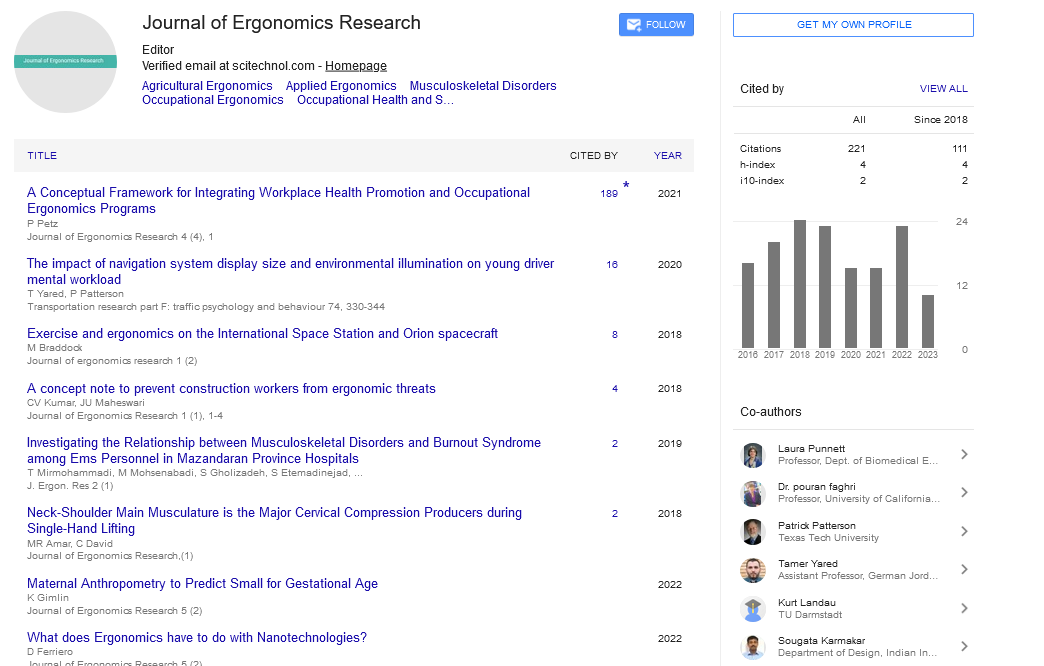Opinion Article, J Ergon Res Vol: 6 Issue: 4
Importance of Physiology and its Advancements
Jiang Alli*
1Department of Anesthesia, Unity Health Toronto, Toronto, Ontario, Canada
*Corresponding Author: Jiang Alli,
Department of Anesthesia, Unity Health
Toronto, Toronto, Ontario, Canada
E-mail: alli.j@gmail.com
Received date: 21 November, 2023, Manuscript No. JEOR-23-123992;
Editor assigned date: 23 November, 2023, PreQC No. JEOR-23-123992 (PQ);
Reviewed date: 07 December, 2023, QC No. JEOR-23-123992;
Revised date: 15 December, 2023, Manuscript No. JEOR-23-123992 (R);
Published date: 22 December, 2023, DOI: 10.4172/JEOR.1000147.
Citation: Alli J (2023) Importance of Physiology and its Advancements. J Ergon Res 6:4.
Description
Physiology, frequently recognized as the foundation of the medical sciences, it is the branch of biology that studies the functions and mechanisms of living organisms. In particular, human physiology delves into the complex operations of the human body, from the cellular level to the integrated functioning of organ systems. By separating the complexities of physiological processes, researchers and healthcare professionals gain essential insights into health, disease, and the maintenance of homeostasis-the body's ability to regulate its internal environment.
Foundations of physiology
Because physiology focuses on the functions and mechanisms of living organisms at all levels, from the molecular and cellular level to the level of whole organisms and populations, its foundations span a wide range of specific disciplines:
Cellular physiology: Physiology is the study of individual cells-the developing elements of life. Cellular physiology investigates how cells carry out essential functions, such as energy production, transport of substances, and communication.
Organ systems: Physiology transcends to the cellular level to explore the coordinated activities of organs and organ systems. Each organ system, including the cardiovascular, respiratory, nervous, and endocrine systems, has distinct physiological functions contributing to the overall well-being of the organism.
Homeostasis: A central theme in physiology is homeostasis, the body's ability to maintain a stable internal environment despite external fluctuations. Homeostatic mechanisms involve feedback loops that regulate variables such as temperature, blood pressure, and glucose levels to ensure optimal physiological conditions.
Applications of physiology
There are wide ranges of physiology applications include:
Medical practice: Physicians depend on a deep understanding of human physiology to diagnose and treat medical conditions. Knowledge of physiological processes guides clinical decisions, medication management, and the interpretation of diagnostic tests.
Pharmacology: Pharmacologists study how drugs interact with the body, affecting physiological processes. Understanding the pharmacokinetics and pharmacodynamics of drugs is essential for developing safe and effective medications.
Exercise physiology: Exercise physiologists explore how the body responds to physical activity and exercise. This knowledge informs the development of fitness programs, rehabilitation techniques, and the optimization of athletic performance.
Environmental physiology: Environmental physiologists investigate how the body adapts to various environmental conditions, such as extreme temperatures or high altitudes. This field is essential for understanding human resilience in challenging environments and guiding safety protocols.
Fundamental concepts of physiology
Some of the important Fundamental concepts of physiology including:
Neurophysiology: Neurophysiology focuses on the functions of the nervous system, including the generation and transmission of nerve impulses. Understanding neurophysiological processes is essential for comprehending sensory perception, motor control, and cognitive functions.
Cardiovascular physiology: Cardiovascular physiology explores the functions of the heart and blood vessels. Concepts such as cardiac output, blood pressure regulation, and circulatory dynamics are fundamental to understanding cardiovascular health.
Respiratory physiology: Respiratory physiology delves into the mechanisms of breathing, gas exchange, and oxygen transport. This knowledge is important for diagnosing and managing respiratory disorders and optimizing respiratory function.
Endocrinology: Endocrinology focuses on the study of hormones and their effects on physiological processes. Hormones play an important role in regulating metabolism, growth, reproduction, and stress responses.
Challenges and advancements in physiology
As these advancements continue to shape the landscape of physiology, researchers and healthcare professionals are better equipped to unravel the challenges of the human body and develop innovative methods to address physiological challenges. Some fundamental advancement includes:
Systems biology: Systems biology integrates physiological data with other biological disciplines, aiming to understand complex interactions within living organisms. High-throughput technologies and computational techniques contribute to a holistic understanding of physiological networks.
Precision medicine: Advances in genomics and personalized medicine leverage physiological insights to tailor medical treatments to individual patients. This technique considers genetic variations and physiological factors to optimize therapeutic outcomes.
Neuroplasticity and brain health: Continued investigation in neurophysiology explores the concept of neuroplasticity-the brain's ability to adapt and reorganize. Understanding neuroplasticity is essential for developing interventions to promote brain health and recovery from neurological disorders.
 Spanish
Spanish  Chinese
Chinese  Russian
Russian  German
German  French
French  Japanese
Japanese  Portuguese
Portuguese  Hindi
Hindi 